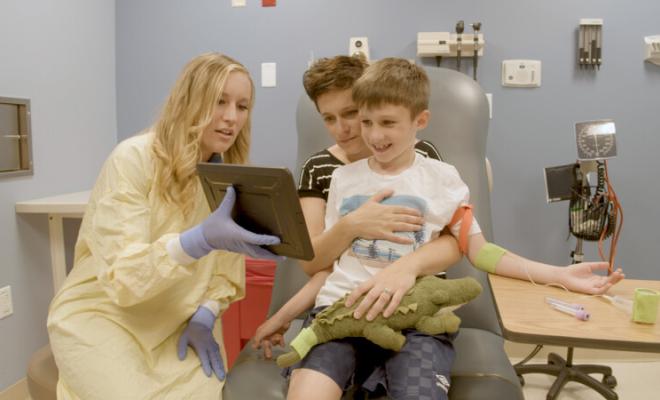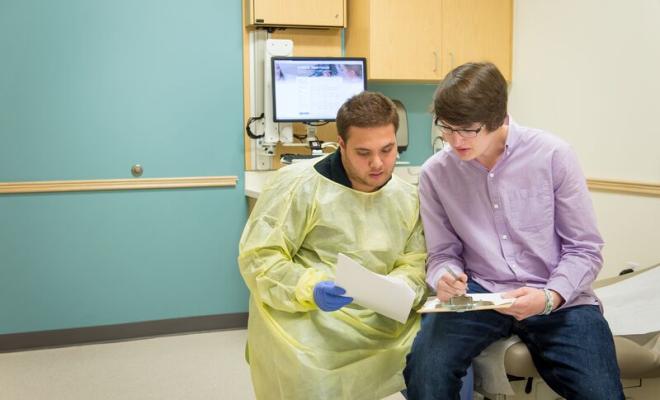Accommodating Your Schedule
Some studies only require a single visit, while others require many visits over a longer period of time. Study visits can also vary in length — one study might only require a quick blood draw, while another may require several hours of testing. Ask the research team about the time commitment for the trial so you know how many visits you will need to make and how long they will last.
If the trial is taking place at your care center, the research team can coordinate with your CF care team so that you can do the study visit and your regular quarterly visit on the same day. Appointments can be moved to the beginning or end of the day to accommodate your work schedule.
If you believe there are other obstacles to participating, your research team might be able to engage in some creative problem-solving with you. For example, some parents have had problems with schools allowing time off for children with CF to participate in clinical trials. If that is the case, your care center doctor can send a letter to the school stating why the children need to participate.
Traveling to a Different Care Center
Some trials may take place at your usual care center, but other trials are happening at different care centers all over the country. You can ask to participate in any clinical trial you qualify for, regardless of location.
If you choose to participate in a trial that is farther away, you'll need to think about travel to the study site:
- Will you drive, fly, or take other transportation to get there?
- Will you need to stay overnight in a hotel?
- Will you need to take time off from work?
- Will you need child care during the study visit?
In some cases, the research team may be able to arrange for some of the study visits to take place closer to you. For Brandon Erhart, an adult who has CF, the research team was able to arrange for him to get the study's routine blood draws at a hospital close to his college campus. This saved him from having to travel two hours to get them done at the study site.
“I've just had nothing but collaboration on all ends, which has been really positive.”
-- Brandon Erhart, who participated in three CF clinical trials
Compensation and Reimbursement
You will not be charged a fee to participate in a clinical trial, but you may incur expenses as a result of participating.
Most studies offer reimbursement for these kinds of study-related expenses:
- Meals
- Mileage
- Parking
- Airfare
- Hotel stay
Some expenses, such as child care, may not be covered. Before enrolling in a trial, ask the research team if these costs will be reimbursed.
If the trial is more than 200 miles away, the study sponsor will usually cover the cost of flying. For minors, the study sponsor will pay for the participant and one parent or guardian. Consideration may be given to offsetting the travel costs of a travel companion for adults.
If you are unable to cover study-related expenses upfront, ask the research team if they can make arrangements for you. They may be able to cover certain costs — such as providing a prepaid gas card or a ride service to and from study visits – so that you don’t need to wait to be reimbursed.
How Does Compensation Work?
In addition to reimbursing your expenses, some clinical trials may compensate you for participating. This is a decision made by the trial sponsor, who is paying for the study. You will receive information about compensation during the informed consent process before the study begins.
Compensation varies and is given to pay for your time. It can help offset the costs of participating that are not reimbursed, such as time taken off from work. For trials within the Therapeutics Development Network, the most recent guidelines for compensation for a participant (or a parent who needs to take time off of work to bring a child in for a study visit) suggest a maximum of $30 an hour, up to a maximum of $300 for a single visit. These amounts may be adjusted in areas where the cost of living is higher than the rest of the country.
The Cystic Fibrosis Foundation spearheaded an effort to ensure that those with rare diseases such as CF can receive compensation for participating in clinical trials without losing critical benefits. The Ensuring Access to Clinical Trials Act allows participants in clinical trials for rare disease therapies to receive up to $2,000 a year without that compensation affecting their eligibility for Supplemental Security Income or Medicaid benefits.
Compensation and Taxes
The IRS requires research institutions to report compensation to clinical trial participants if the amount is $600 or more a year. Your study site will send you IRS Form 1099 as a record of this payment for you to include with your tax return. Reimbursement of expenses is not considered compensation.



